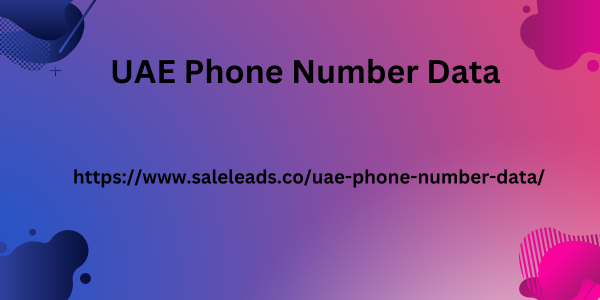Post by badupvex on Nov 16, 2024 4:39:42 GMT
Yes, there are some restrictions in making international calls to UAE numbers because of the enabling regulatory framework and communications policies of the country. The guiding rules for these restrictions are within the purview of TDRA, an authority regulating the telecom sector in the UAE. Even though international calls are permissible in the country, there is a number of restrictions to enforce security, control usage, and ensure quality service.
1. VoIP Restrictions
The ban on VoIP services probably heads the list of most recognized restrictions within the UAE. While Skype, WhatsApp calling, Viber, and FaceTime provide the ability for people in many countries around the globe to communicate UAE Phone Number Data with one another, they are restricted within the UAE to not allow them to be used for direct voice calling, though using workarounds like VPNs provides access to internet-based messaging and voice services. The UAE government had identified security and competition as the reasons it blocked VoIP calls because local providers such as Etisalat and du sell their paid international call services to their subscribers.
In general, calling UAE numbers from abroad means the need to use traditional telecom providers or approved international calling services, which correspondingly translates to higher call rates.
2. Monitoring and Security Concerns
It has strict monitoring and surveillance laws in the UAE, wherein international calls to or from the country may be legally intercepted for surveillance, under certain conditions. These are not mere local call monitoring laws; they extend further, even to international communications. The government does not allow illegal activities that include the use of telecommunication systems for terrorism or espionage.
3. International Calling Services Restrictions
Except for general international calls to UAE numbers, there are several restrictions to the services that can be accommodated. For instance, international calling cards and services may be required to adhere to local regulations on telecom, and as such have to be registered with UAE authorities to function properly. There may be some restrictive routing by some international carriers when making calls to UAE numbers, which leads to delays or a limit to some types of international calls.

4. Special Numbers and Emergency Services
Such access may be limited in the case of some premium-rate or special service numbers, among them those of emergency services or particular government services. Overseas callers are not in a position to get through to such numbers unless they physically are within the UAE's telecommunication network.
5. Access to International Contents
Another problem that might occur in international calls is the issue of accessed or discussed content. With heavy internet censorship and strict control over foreign content in the UAE, some types of international communications, including media and certain discussions, may be flagged or restricted should they happen to be deemed inappropriate or against UAE laws and values.
Conclusion
While calls to UAE numbers are generally open to international calls, there are restrictions, especially on internet-based communication or VoIP, certain content regulations, and government monitoring. Calls to UAE numbers from abroad should, therefore, be made using approved services like traditional telecom networks or international calling cards, as such alternative methods may be restricted or poor in quality.
1. VoIP Restrictions
The ban on VoIP services probably heads the list of most recognized restrictions within the UAE. While Skype, WhatsApp calling, Viber, and FaceTime provide the ability for people in many countries around the globe to communicate UAE Phone Number Data with one another, they are restricted within the UAE to not allow them to be used for direct voice calling, though using workarounds like VPNs provides access to internet-based messaging and voice services. The UAE government had identified security and competition as the reasons it blocked VoIP calls because local providers such as Etisalat and du sell their paid international call services to their subscribers.
In general, calling UAE numbers from abroad means the need to use traditional telecom providers or approved international calling services, which correspondingly translates to higher call rates.
2. Monitoring and Security Concerns
It has strict monitoring and surveillance laws in the UAE, wherein international calls to or from the country may be legally intercepted for surveillance, under certain conditions. These are not mere local call monitoring laws; they extend further, even to international communications. The government does not allow illegal activities that include the use of telecommunication systems for terrorism or espionage.
3. International Calling Services Restrictions
Except for general international calls to UAE numbers, there are several restrictions to the services that can be accommodated. For instance, international calling cards and services may be required to adhere to local regulations on telecom, and as such have to be registered with UAE authorities to function properly. There may be some restrictive routing by some international carriers when making calls to UAE numbers, which leads to delays or a limit to some types of international calls.

4. Special Numbers and Emergency Services
Such access may be limited in the case of some premium-rate or special service numbers, among them those of emergency services or particular government services. Overseas callers are not in a position to get through to such numbers unless they physically are within the UAE's telecommunication network.
5. Access to International Contents
Another problem that might occur in international calls is the issue of accessed or discussed content. With heavy internet censorship and strict control over foreign content in the UAE, some types of international communications, including media and certain discussions, may be flagged or restricted should they happen to be deemed inappropriate or against UAE laws and values.
Conclusion
While calls to UAE numbers are generally open to international calls, there are restrictions, especially on internet-based communication or VoIP, certain content regulations, and government monitoring. Calls to UAE numbers from abroad should, therefore, be made using approved services like traditional telecom networks or international calling cards, as such alternative methods may be restricted or poor in quality.
